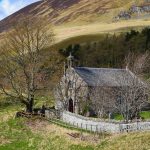Finn mac Cumhaill was a legendary Celtic figure and leader of the mythic warrior band called the Fianna. He is often portrayed as a giant and described as “the greatest warrior and poet”.
The Fianna spent their time hunting across all the Celtic lands. The first half of the year (Summer: Beltain to Samhain) was spent hunting with dogs and the rest of the year (Winter: Samhain to Beltain) they took the hospitality of the provincial kings and clan chiefs.
Finn and his warriors are said to have hunted all over this area after boar, leaving traces in some of the Glenshee's hill names, for example Carn an Tuirc meaning hill of the boar and Ben Gulabin , which ostensibly means 'snouty mountain'.
Amongst the large number of tales of their hunts, chases and deeds, one tells the story of the handsome Diarmuid O’Duibne - of the Bright Face.
Diarmuid was one of Finn’s brave and handsome warriors, who caught the eye of Grainne, Finn’s beautiful young bride of his maturing years. It is said that Grainne cast her magic upon Diarmuid and they eloped, living life on the run for 16 years with Finn always in pursuit.
Eventually Finn caught up with them and goaded Diarmuid into killing a boar on the slopes of Ben Gulabin. This was a magical boar - said to be the half brother of Diarmuid who also wanted revenge. The magic meant that Diarmuid’s slingshot made no impact, his hound ran off in the opposite direction, his spear bounced off and the boars teeth sank into his arm. The pair rolled down the sides of the mountain, the tusks ripping open the warriors stomach and as Diarmuid made his final thrust into the boars throat, the spell lifted and his half brother returned to his human form and died.
Another part of the legend tells that Finn, who had been watching this fatal hunt could have saved Diarmuid by using his powers of life saving by gathering water in his hands from a nearby spring . Finn battled with his jealousy and conscience and twice spilled the water from his hands and when, on the third attempt he brought the water to Diarmuid, as he bent down to reach Diarmuid's face, he died.
Some versions of the legend tell of heartbroken Grainne dying too and both their graves being in the mound of Diarmuid's Tomb.
Other versions of the legend say that Finn reclaimed his bride, but none of the other warriors would go near her in case she cast her spell over one of them as she had done with Diarmuid and that she spent her remaining years virtually imprisoned by Finn.
Variations of this story are told in other parts of Scotland and Ireland.
There is a 16th century poem, set in Glenshee, that also relates the tale:
“In the glen, below Ben Gulbin green,
Whose tulachs gleam in the sun,
The river’s flow was stained with red
When deer fell to Fionn of the fairies”
and goes on to tell
“ hear my lay…..of Ben Gulbin, of generous Fionn, and Diarmid O Doon … a tale of grief”.
The mound was excavated in 1894 and was found to be as a result of glaciation, with no finds or structures.
More about Finn
Finn is the central character of the Fenian cycle of Irish mythology.
From his youth Demne MacCumhaill was a notable figure and referred to as the Fair one (Finn). A skilled hunter, he followed in his father’s footsteps as a mighty warrior, which caused those around him to keep moving him on to prevent being killed by a rival clan.
It came to be that he ended up as apprentice to a wise old poet, once also called Finn but now called Finneces (White wisdom) who had spent several years attempting to catch the great salmon that was supposed to be the soul of the great seer Fintam himself – he who knew the deepest memories of the land of Ireland. Legend had it that all those who ate the salmon would receive this knowledge. The old poet was glad of a younger man’s services and so it was that one day the two of them caught the great salmon. Finneces was too excited to cook the fish so Finn was ordered to do so, along with the order not to eat any of its flesh.
So Finn roasted the salmon over the fire, but as he lifted it from the fire some of the hot juices splashed onto his thumb, and as he instinctively licked the burn, the knowledge entered into him. In that moment he knew everything from the beginning of time and into the future. Wise Finneces realised that the prophecy of Fionn eating the Salmon of Wisdom was indeed not him, but Finn MacCumhail. He gave the rest of the salmon to Finn which they then shared but the wisdom had already transferred in the first few drops of juice. This is how Finn MacCumhaill acquired knowledge and understanding of many things far beyond that of the ordinary man.
He gained the gift of poetry on that same day and his first poem which he told to Finneces has been passed on by the bards ever since:
“May, fair-aspected,
Perfect season. Blackbirds sing,
Where the sun shows.
The hardy cuckoo calls,
A welcome to noble summer,
Ends the bitter storms,
That strip the trees of wood.
Summer cuts the streams,
Swift horses seek water,
The heather grows tall,
Fair foliage flourishes.
The hawthorn sprouts,
Smooth flows the ocean,
Summer causing it to sleep,
Blossom covers the world.
The true man sings,
Gladly in the bright day, sings loudly of May,
Fair aspected season!”
Finn no longer had to hide from his enemies and he became the leader of the Fianna and the most feared and honoured warrior in all of Ireland.
Sources: Scottish Hill and Mountain Names by Peter Drummond, Scottish Mountaineering Trust, 1991, Glasgow, Celtic Myths and Legends, Caitlin Mathews, John Mathews, The Folio Society London, 2006



